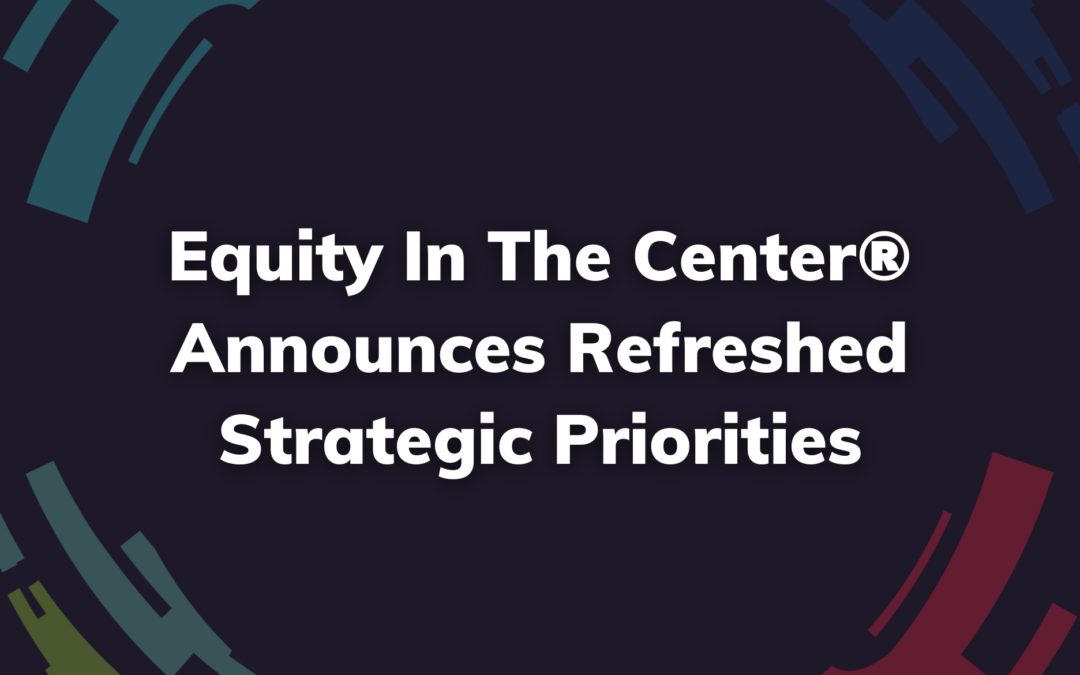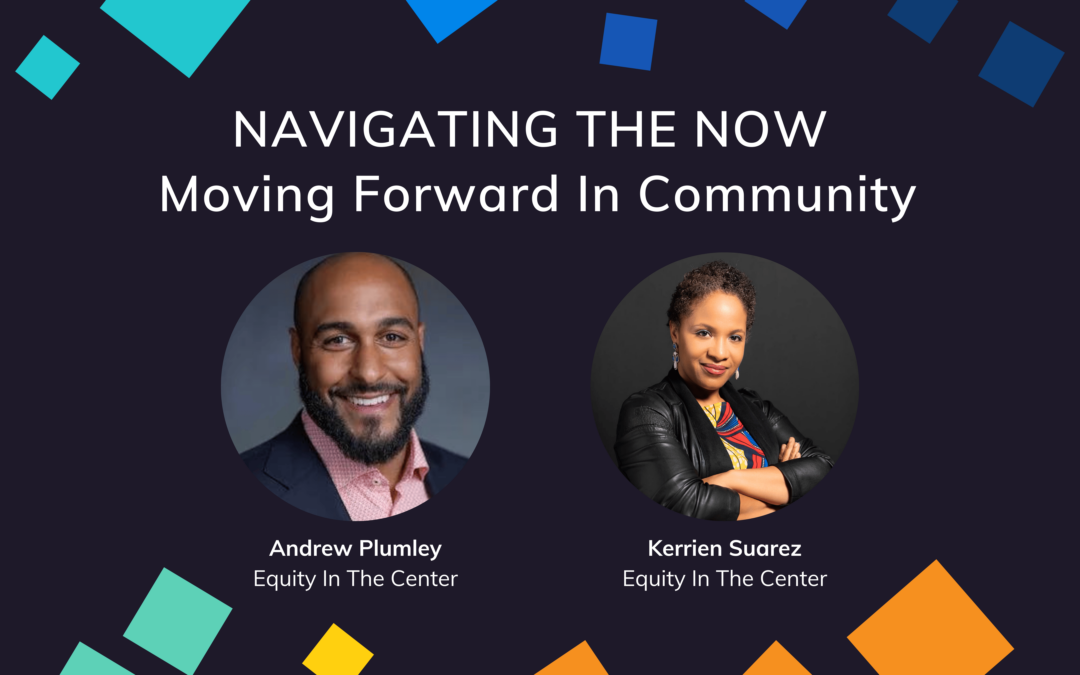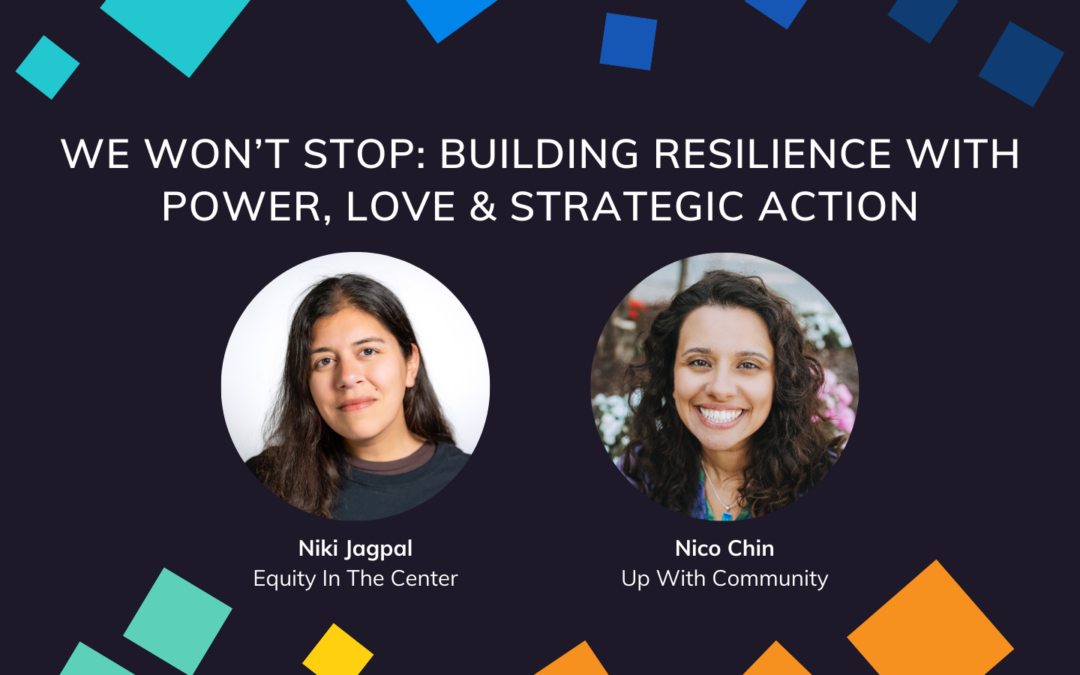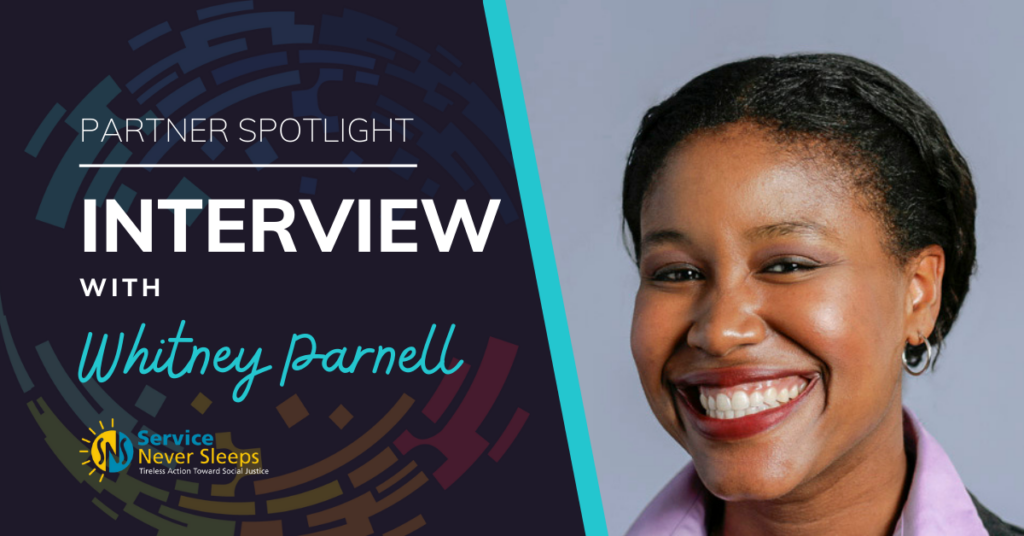 Kicking off this new EIC partner spotlight series is Whitney Parnell (she/her), Founder and CEO of Service Never Sleeps (SNS)! Whitney is the facilitator of our virtual partner trainings, BIPOC Allies, held quarterly, and White Allies, held monthly. She recently sat down with Equity In The Center to chat all about the founding of her org, truly committing to the allyship lifestyle, and the upcoming SNS Allyship Summit that’s themed “What does it mean to be Black-led?”
Kicking off this new EIC partner spotlight series is Whitney Parnell (she/her), Founder and CEO of Service Never Sleeps (SNS)! Whitney is the facilitator of our virtual partner trainings, BIPOC Allies, held quarterly, and White Allies, held monthly. She recently sat down with Equity In The Center to chat all about the founding of her org, truly committing to the allyship lifestyle, and the upcoming SNS Allyship Summit that’s themed “What does it mean to be Black-led?”
This interview has been edited for length and clarity.
Q: What led you to start Service Never Sleeps?
Whitney: I’m the daughter of the Foreign Service so one of the most stressful questions I’m asked is, “Where are you from?” I’m African American and grew up between Latin America and West Africa. It was an amazing lifestyle. It emphasized that diversity is a beautiful, wonderful thing that only makes us better, period, and that injustice is universal. So when I lived in the US for college, I was automatically struck by the unique systemic way that injustice shows up here rooted in racism. After college, I went to DC and served with AmeriCorps for a couple of years, met one of my closest friends, Samson, and then I worked in the houselessness field for three years.
I was moved by working for organizations that had really important missions but lacked the capacity to execute them fully. I was also talking to other millennials who were saying, “I was so involved in college and now all I do are spreadsheets!” I was also thinking about the role that AmeriCorps played in my commitment to service being so proximate to my community. So those three things led me to the first idea that was Service Never Sleeps, which was creating a year of part-time service for young working professionals, where we match them with local nonprofits to do skills-based services and help them further execute their missions. We’re building this next generation of leaders who are committed to justice and are actively involved in their community while still doing whatever their career goals are. I called up Samson and asked him to be my co-founder, built this organization, and went full-time in October 2015.
“SNS’ journey is parallel to my journey and I’ve only recently given myself permission that that’s ok. That informs, particularly with all the ancestral knowledge of being a Black woman, and also allows the potential for this org to be great.”
Q: How has SNS changed since your first year?
Whitney: In our first year we launched our fellowship and it was going great, but I started to hear this narrative from folks that was turning the mission capitalistic. They were like, “Oh, it’s the triple win – nonprofit, millennial, corporate.” And I was like, “That’s not the point at all!” Then the elections happened in 2016 and I was done being told that it’s my job to handle anti-Black racism and sexism – that’s primarily on white people, and sexism is for men to handle. Then I thought, “But if I’m saying that that’s required allyship, then in my areas of privilege being straight, cisgender, non-disabled, having housing, and US citizenship, I should be an ally too.” I decided then that we’d launch an allyship workshop where we teach people where they have privilege, explain that’s where they should be an ally, and teach them how.
In 2017, we rebranded our organization to “Allyship,” and tried out the workshop. In those first months, I was so aware of how white people have a problem centering their responsibility on race, so I made it level with every other issue. Then I was a counter-protester in Charlottesville that August during the historic white supremacist rally, which I am forever traumatized from. It completely removed any censor because I was unapologetically clear about the fact that that has to be the focus, particularly anti-Blackness, in order to work toward everyone’s liberation From there, SNS became a racial justice organization, and our Allyship training centered race.
In 2020, Samson came on full-time as COO. Not only has it been so amazing to work with one of my closest friends, but having two Black people as co-founders, CEO and COO, focusing on racial justice. The uprising happened that summer after the murders of Ahmaud Arbery, Breonna Taylor, and George Floyd, and everybody wanted to commit to racial justice. We then deepened our identity of being a Black-led org. SNS’ journey is parallel to my journey and I’ve only recently given myself permission that that’s ok. That informs, particularly with all the ancestral knowledge of being a Black woman, and also allows the potential for this organization to be great.
Q: What are some of the challenges of facilitating allyship trainings as a Black woman?
Whitney: There’s emotional labor that comes with it. There’s what happens to your brain and your spirit when constantly talking about racism, and constantly having to give yourself in order to provide that proximity through humanity. And then imagine the psychological impact of doing that on repeat. So I have to emphasize that it’s so much labor, truly full-body labor, which is why it must be paid for because that’s another challenge. Folks are conditioned that Black women’s labor, in particular, should be for free because that was this land’s first disposition with Black women.
Another challenge that is a lot of white folks come to this training thinking that they know everything, and that they’re just there to learn how to talk to their racist family members. People need to come with a disposition of humility, a readiness to learn, and an understanding of the inside-out work that is allyship.
“It’s awesome to see people who are truly transformed and understand that they have a forever posture that they’re taking from this training. That gives me so much life and energy. It’s a reminder that there are folks out here who wanna do the work, which is what we need.”
Q: What are some things you love about being in these spaces?
Whitney: I will say that there’s just empowerment in being able to just say all the things. I feel like society conditioned me to just not talk about things, and to just bear it and that’s it. So to have a space where I am speaking truth to power through my own authentic voice, I don’t take that for granted, especially hearing from so many other BIPOC folks in their workspaces who have to stay silenced and masked. I am just really grateful that I’m dispositioned to be able to speak truth. I’ll also say that while there are always the one or two people in the training that think they know everything and cause me so much trouble, the trainings are mainly made up of people who are wanting to do the work and willing to learn. It’s awesome to see when people are truly transformed, and understand that they have a forever posture that they’re taking from this training. That gives me so much life and energy. It’s a reminder that there are folks out here who want to do the work, which is what we need.
Q: Who should attend your allyship trainings?
Whitney: Sometimes it’s easier for me to explain who shouldn’t attend these trainings. I say that this training is not a history lesson. History is so important and there are great resources out there that teach it. It’s also not the training here to convince people that anti-Black racism exists. That is not my calling. This is for folks who know that these issues exist, want to work towards justice, and understand that there is forever work ahead. I do emphasize that you’re not going to come out of here with an “Allyship checklist.” Come humble, knowing that there’s always work to do on yourself, and come open to really reflect on that.
Q: Do you have any advice for allies who wanna sustain this lifestyle?
Whitney: If you’re doing this work correctly, it should be difficult. It should be exhausting. But it’s not nearly as exhausting as what it’s like to live in this oppression every day. This is forever work. We’re two years after the uprising. When it started, I remember that period when so many white and non-Black folks were saying “I’m committed to this forever, you can’t get rid of me!” And a lot of Black folks had two buckets of reaction, one was, “We’ve been screaming about this forever so why are you only convicted now?” And the other reaction was, “Okay, we’ll see because as much as I want to believe that, history has shown otherwise.” Part of allyship means being aware that in your privilege, you can leave the work at any point.
And so with that, I always give people the four R’s when it comes to committing to the lifestyle. Reflect on how you did. How could you be better? Recharge – do whatever you can for your self-care, restoration, community, and healing. Recommit the next day and do the best that you can to show up. Know that it involves Risk – you can’t do allyship in comfort. Do those four R’s and that daily commitment is what turns into the lifestyle.
“If you’re doing this work correctly, it should be difficult. It should be exhausting. But it’s not nearly as exhausting as what it’s like to live in this oppression every day. This is forever work.”
Q: What is your vision for SNS and the future of allyship trainings?
Whitney: I would love for our Allyship trainings to have enough reach and impact to create a national reputation as a go-to organization for Allyship training. If someone were to say, “I want to be a good ally,” then someone else would tell them, “Call Service Never Sleeps.” So I would like for SNS to keep staying the course of training people with authenticity and conviction, and to genuinely empower and equip as many people as possible to adopt that allyship lifestyle. I always say that it’s the individuals who make up the collective, who then create, drive, and uphold institutions that impact the systems in which we are operating. That’s what movement-building is, and I want us to contribute to that Allyship movement.
As for SNS, I read this book a couple of years ago called Black Fatigue by Mary Francis Winters. And my “aha” this year was that SNS will be the opposite of that – I want SNS to be Black refuge, where folks working here feel cared for, empowered, and like they’re in community. And when Samson came on, it really unlocked this whole journey of what it means to be a Black-led organization.
While that started as an internal thing, it’s turned into an external project for us and we’ve spent this year researching that premise: “What does it mean to be Black-led?” We have interviewed dozens of Black leaders to explore this question from a qualitative lens. It has been an amazing experience, and has informed and empowered us so much. We’re going to be introducing phase one of that research this fall at our Allyship Summit. Kay [EiC President] is actually going to be the keynote speaker. So what’s next is a deepening of this really important Black-led piece that I’m really excited about.
Q: So we spoke about SNS, but what about you? What’s your vision for your future?
Whitney: Startup life usually means your whole life is building this organization, but SNS is part of my life, not my whole life. I’m a singer before anything else. I dropped an album earlier this year called What Will You Do? My calling is certainly racial justice and I’m trying to explore how SNS can really live into that. How can I live into that in other ways without feeling like a martyr? I’m trying to live as powerfully and abundantly as I can, which I know I have every right to experience and be.
Register for SNS’ trainings hosted by Whitney: BIPOC Allies or White Allies. Connect with her on LinkedIn and check out her music videos on YouTube!
